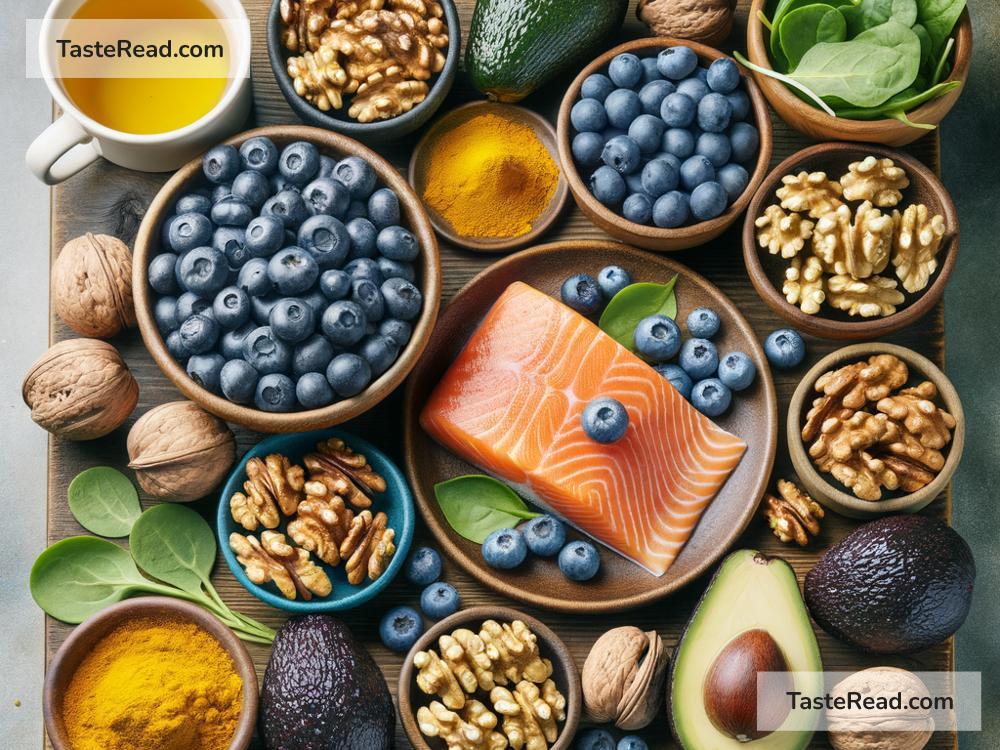Foods for Brain Health: Eating Right to Stay Sharp
Your brain is one of the most important parts of your body. It controls everything you do, thinks, and feels. That’s why it’s super important to take good care of it. One of the best ways to keep your brain healthy is by eating good food. What you eat has a direct impact on how your brain works, how well you think, and even how you feel.
Let’s explore some of the best foods for brain health that are easy to include in your daily diet!
1. Fatty Fish: Brain Fuel for Better Thinking
Fatty fish like salmon, mackerel, trout, and sardines are among the best foods for your brain. These fish are rich in omega-3 fatty acids, which your brain needs to function properly. Omega-3s are special fats that help build brain cells and improve learning and memory.
Studies show that omega-3s can also slow age-related brain decline and reduce the risk of Alzheimer’s disease. If you don’t eat fish, you can still get omega-3s from walnuts, flaxseeds, and chia seeds.
2. Blueberries: Tiny But Powerful
Blueberries may be small, but they pack a big punch for brain health. These colorful berries are full of antioxidants, which protect your brain from damage caused by aging. Antioxidants help reduce inflammation and stress in the brain, allowing it to work more efficiently.
Research suggests that eating blueberries can improve memory, boost communication between brain cells, and even reduce your risk of dementia. Adding a handful of blueberries to your yogurt, oatmeal, or smoothie is an easy and tasty way to encourage brain health.
3. Leafy Greens: The Brain’s Best Friend
Vegetables like spinach, kale, Swiss chard, and broccoli are loaded with brain-supporting nutrients. They are high in vitamins like vitamin K, folate, and beta carotene, which help keep your brain sharp as you age.
Studies have shown that eating leafy greens regularly may slow brain aging and improve your ability to think, focus, and remember things. Add greens to your salads, soups, or smoothies to sneak them into your meals.
4. Nuts and Seeds: Snack Smart for Your Brain
Nuts and seeds give your brain a quick boost thanks to their healthy fats, antioxidants, and vitamins. Walnuts, for example, are rich in omega-3s and vitamin E, which protect your brain from damage and improve memory.
Pumpkin seeds are another top choice, as they contain important minerals like magnesium, iron, and zinc—all of which support brain health. Next time you’re craving a snack, grab a handful of nuts or seeds instead of chips or candy.
5. Whole Grains: Fuel for Focus
Your brain needs energy to work its best, and whole grains are a great source of slow-releasing energy. Whole grains like brown rice, oats, quinoa, and whole wheat bread contain complex carbohydrates that keep your glucose levels stable. This makes it easier to concentrate and stay focused.
Whole grains are also rich in B vitamins, which improve brain health by supporting communication between brain cells. Swap white rice for brown or white bread for whole-grain options whenever possible.
6. Eggs: Memory Boosters in Every Bite
Eggs are affordable, delicious, and great for your brain. They are packed with vitamins like B6, B12, and folate, which are important for healthy brain function. Eggs also contain choline, a nutrient that your body uses to make neurotransmitters, which support memory and mood.
Enjoy eggs boiled, scrambled, or as part of an omelet—they’re a convenient way to give your brain what it needs to thrive.
7. Dark Chocolate: A Tasty Brain Treat
If you love chocolate, here’s some good news: dark chocolate can benefit your brain! Dark chocolate (with at least 70% cocoa) is high in antioxidants and flavonoids, which improve blood flow to the brain and enhance brain functions like focus and memory.
However, moderation is key. Eating a small piece of dark chocolate a day can be good for your brain, but too much can add unwanted sugar and calories.
8. Avocados: Creamy Brain Boost
Avocados are rich in healthy fats and vitamin E, both of which support brain health. The healthy monounsaturated fats in avocados contribute to better blood flow, ensuring your brain gets the oxygen it needs.
They’re also great for heart health, and since your heart and brain work closely together, keeping your heart healthy helps your brain, too. Blend avocados into smoothies, spread them on toast, or enjoy them as part of a salad.
Take Care of Your Brain by Eating Right
What you eat matters. Including brain-friendly foods in your diet doesn’t mean you have to completely change what you eat—it’s about making small, healthy swaps. Focus on adding more fatty fish, blueberries, leafy greens, nuts, seeds, whole grains, eggs, dark chocolate, and avocados into your meals.
Other tips for brain health include staying hydrated, eating in moderation, and avoiding overly processed junk food. Pair good nutrition with regular exercise, quality sleep, and managing stress to give your brain everything it needs to stay healthy for the long term.
Conclusion
Your brain works hard every day, and it deserves the best care you can offer. By choosing foods that support brain health, you’re not only helping your memory and thinking skills—but also improving your overall well-being. So, next time you’re planning meals, think about your brain and pick foods that keep you sharp, focused, and feeling good!
Take the first step by trying a few of these foods today—you may be surprised at how much of a difference they make!


